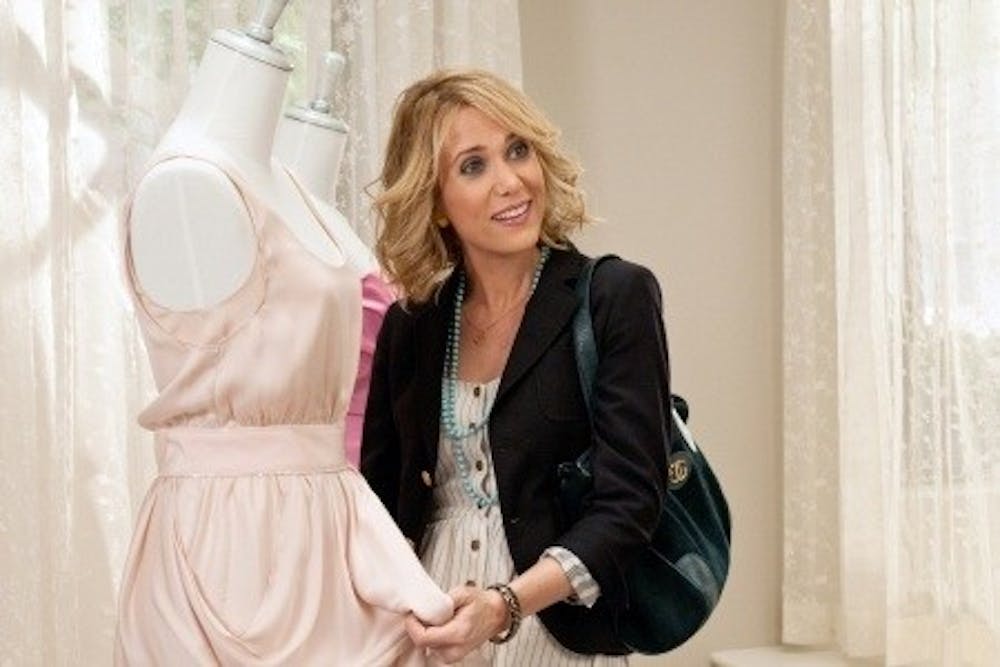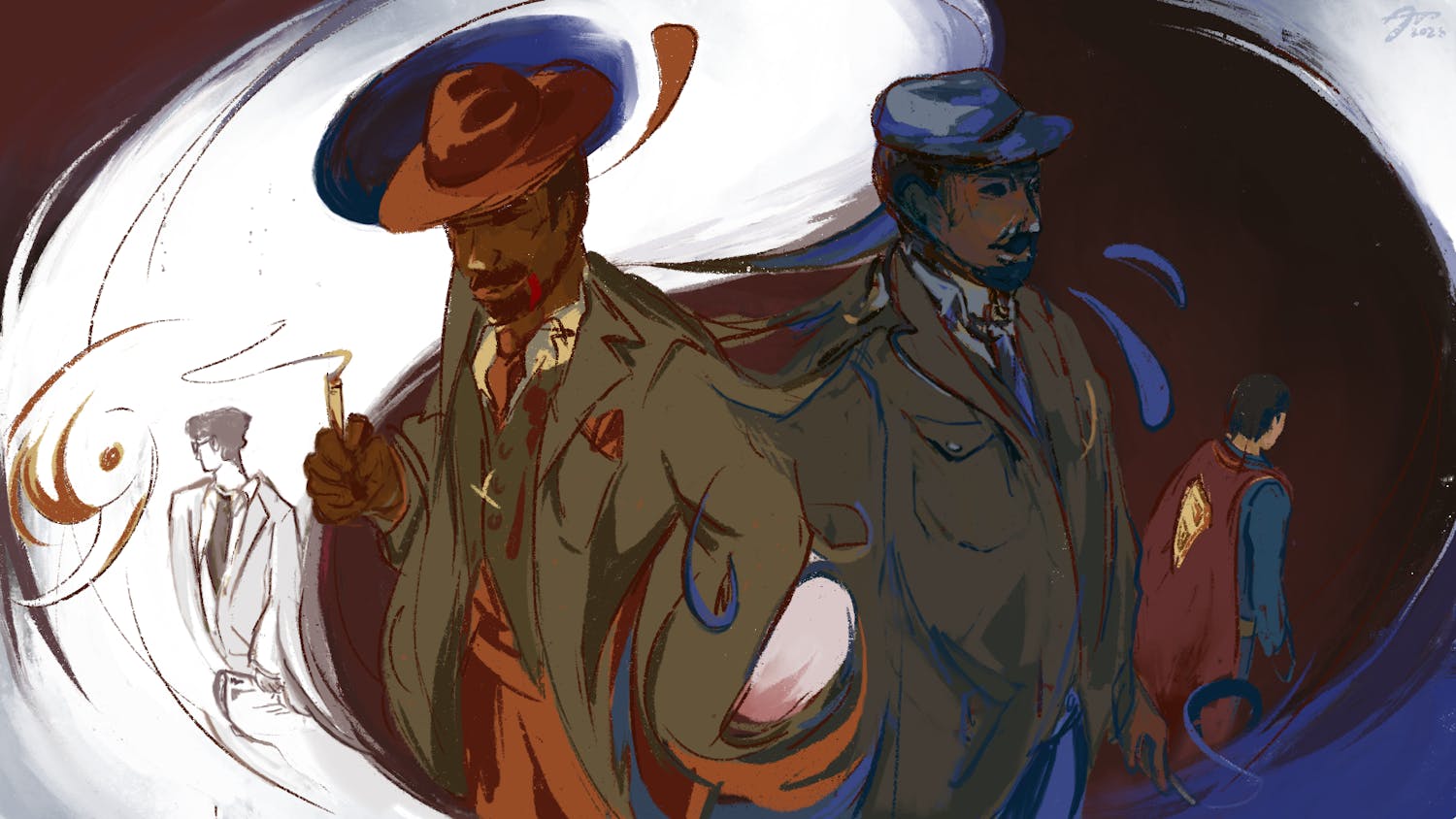Street: Comedy is an area that's often seen as being male–dominated. What was it like to work in a cast that is primarily female? Kristen Wiig: It was great, but not because other comedies are mostly men, because — I personally love working with women also. When Annie and I wrote this movie, that was our first priority. We were like, 'Let's write a movie that has a lot of funny ladies in it — ladies that we know, and ladies that we'd love to work with.' You know, it's rare — and it shouldn't be — that there's a movie poster with six women on it. And hopefully that will change, and people won't see it as such a rare thing. Wendy McLendon-Covey: It shouldn't be such a confounding thing. They wanted to write a movie with funny women, but not a chick flick. They just wanted to cast their friends, all the people that they knew. That was their first priority. KW: It wasn't a response. It wasn't like, 'Wait, now it's our turn!' It was just, 'Let's write a funny movie.' WMC: The backdrop of a wedding just happens to bring out everybody's issues, so I think that's where that came from. There was no agenda.
Street: How did you develop the camaraderie we see on screen? Did you all have the chance to get together before you started making the film? KW: Wendi [McLendon–Covey], Maya [Rudolph], Melissa [McCarthy] and I were at the Groundlings — some of us at different times. Maya was before me, but Ellie [Kemper] and Rose [Byrne] came in but easily fit in, like right away. It was just instant family. But we did have a little bonding experience. Before we started shooting, Annie [Mumolo] and I — the co–writer — we thought we could have a girl's night out. So we rented a party bus and filled it with booze and music, and drove around LA and went to a male strip club for research and a bonding night. It was really fun. WMC: But we also rehearsed together a few weeks, so we got to really get into each other's headspace, about how people wanted to play their characters. By the end of the rehearsal, we were just like, 'I love you!" KW: And we hadn't even started shooting yet.
Street: Were there any incredible revelations during this bonding night, either about each other, or about the experience of seeing male strippers? WMC: The revelation was that it's not sexy. It's more disturbing. KW: It's like a show. They come out to Kenny Loggins, Top Gun, he's got his Top Gun hat on, girls are screaming, and it's like a theater show. All we did was scream and drink. WMC: We screamed and took pictures with our phones of some really awkward positions. KW: It was more like a fun theater show — it’s corny. WMC: And I bought Rose Byrne a lap dance, and I've never seen anything so unsexy in my life. It was basically an oily man sitting on top of Rose, and they were having a conversation. I was like, 'Let's get to it! Come on, this is her first one! You're boring her!'
Street: What was is like working with director Paul Feig? KW: It’s so hard to describe him, because I want to say so many nice adjectives. He is truly an actor's director. He's a dream. He's so nice and nurturing if you have an idea about something, or you don't feel comfortable about something, or you want to expand on something — I don't even know how to say enough nice things about him. He's very collaborative. WMC: He's collaborative, he's funny, he's a writer — so he knows what writers go through — he's an improviser — he used to do the improv circuit back in the day — and he understands that as an actor, sometimes you need to rev up a little bit to get into a scene, so he'll give that to you. And if he doesn't like what you're doing, it never shows on his face. He's always very encouraging. 'Okay, well we got that, why don't we try it this way?' Very strengths–based approach. KW: He always made you feel like you were doing a good job. WMC: And a snappy dresser. And that is widely known in Hollywood. KW: Suit and tie everyday — even if it's three in the morning. We had a "Dress Like Paul Feig Day" on the set, where everyone wore ties and fedoras, and people forgot and made ties out of tape. WMC: He really wanted to find a way into the heads of the ladies, because he was under the impression that women thought about things a certain way. As we would rehearse, he's hearing things contrary to what he thought he knew, so he thought, 'Well, okay. We should meet one–on–one so we can discuss all of your characters.' And he took us each out to breakfast, and would write these elaborate back–stories with us, and would say, 'Please call me, or email me, or text me if you have any ideas.' He really encouraged us to come up with our own stuff. We shot everything as written, and then we would improvise for a while. And he's all for that. All he wants to do is make the funniest movie possible.
Street: Is this a script you did for Judd Apatow, or did he come aboard? And what is his involvement with the film? KW: It was for him. He asked me to write something after I did Knocked Up. And he was like, 'Whatever it is, pitch an idea. You can write it alone, you can write it with a friend,' so I called my friend Annie Mumolo, who I wrote a lot with for the Groundlings, and she had the idea, and we pitched it to him, and we just started writing outlines and reading 'How to Write Screenplays' books, and writing and skyping. She was pregnant when she wrote the first draft, nursing while we wrote, all the way up until when we shot, she was seven, eight months pregnant with her second baby. WMC: It took you a while to get this off the ground. KW: We wrote the first draft over four years ago.
Street: So does he get involved at some point? Does he give it that 'Apatow touch?' KW: He was our person that we would send the script to. We would do a draft, and then send it in and nervously await his notes. But even with those they were very like, 'What about this?' or 'What if this happened?' or 'See what happens if this character is actually like this.' It was very collaborative, very throw–it–against–the–wall–and–see–if–it–sticks. Even with shooting. Even up until days before shooting. The whole dress–shop scene — that wasn't in any of our previous drafts. It was something that he and Paul — it was their idea. And at first we were like, 'What? Okay, well we'll write it out…' He was so great though. He was just like, 'Just try it. If it works, we will know if it works, if it doesn't work, we will know if it doesn't work. We won't use it. But as long as we have the chance, just see if it works.' He's really good about that, because we were all like, 'What? We have to all get sick? What is this going to be like?' And it turned out to be one of those scenes that people really talk about in the movie.
Street: You have both acted in a lot of different mediums. Voice acting, TV, movies — which is the most challenging? KW: Each one of them will have its challenges. I don't know if any one is more challenging than the other, but TV is definitely more instant gratification, because you know what it is, but this movie, we shot it almost a year ago, so it's a lot of waiting for it to come out and you just want it to come out. Waiting for it kind of sucks. But that's not challenging. WMC: The gratification of a live audience is very reassuring, because if you do something funny you know immediately. When you make a movie, you just have to send your baby off to kindergarten and hope everybody likes her. KW: Hope she gets a ride home. WMC: Exactly. TV in front of a live audience is fun, but it's fast. [Kristen] knows that from SNL, and the limited experience I have had doing sitcoms in front of a live audience, it's like 'We're not getting into nuance here.' It's just point A, point B, punchline. KW: And goodnight. WMC: It's a very rapid fire medium. KW: But I'm lucky to be able to do all of them, because it’s nice to be able to mix it up and do different things.







